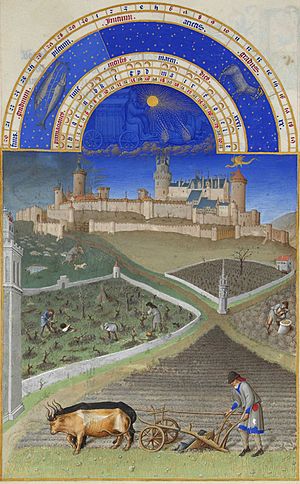March facts for kids
March is the third month of the year in both the Julian and Gregorian calendars. It has 31 days. In the Northern Hemisphere (like North America, Europe, and Asia), March is when spring officially begins.
The March equinox happens around March 20 or 21. This day marks the start of spring in the Northern Hemisphere. It also marks the start of autumn in the Southern Hemisphere (like South America and Australia). For people in the Southern Hemisphere, September is like their March.
Contents
History of March
The name "March" comes from Martius. This was the first month in the very first Roman calendar. It was named after Mars, the Roman god of war. The Romans believed Mars was an ancestor of their people.
His month, Martius, was the start of the season for fighting wars. Festivals were held in his honor during March. These festivals were similar to others held in October, when the fighting season ended. Martius stayed the first month of the Roman calendar for a long time, possibly until 153 BC. Many early celebrations in March were actually new year's parties.
Even much later, in ancient Roman art, March was sometimes still shown as the first month.
In Russia, March 1st was the start of the new year until the late 1400s. Great Britain and its colonies used March 25th as the start of the new year until 1752. That's when they started using the Gregorian calendar, like most of the world. (The financial year in the UK still starts on April 6th, which was March 25th in the old calendar). Many other cultures, like those in Iran or Ethiopia, still celebrate their New Year in March.
March is the first month of spring in the Northern Hemisphere. It's the first month of fall or autumn in the Southern Hemisphere.
Other Names for March
In Finnish, March is called maaliskuu. This name might mean "earthy month." It could refer to the ground finally appearing from under the winter snow. In Ukrainian, it's березень (berezenʹ), which means "birch tree." The Czech word březen also means birch.
Old English names for March included Lentmonat. This name came from the March equinox and the days getting longer. It's also where the word "Lent" comes from. The Saxons also called March Rhed-monat, after their goddess Rhedam. The Angles called it Hyld-monath.
In Slovene, the traditional name is sušec. This means the month when the earth gets dry enough to plant crops. Another Slovene name was brezen, meaning "the month of birches." The Turkish word Mart also comes from the god Mars.
Symbols of March

March has two special birthstones: aquamarine and bloodstone. These stones are said to symbolize courage. The birth flower for March is the beautiful daffodil.
If you were born in March, your zodiac sign is either Pisces (for those born until about March 20) or Aries (for those born from about March 21 onwards).
Special Days in March
Many countries and groups celebrate different events in March. Here are some of them:
Month-long Celebrations
- Endometriosis Awareness Month (International)
- Women's History Month (Australia, United Kingdom, United States)
- National Nutrition Month (Canada, United States)
Important Fixed Dates
- March 1
- Saint David's Day (Wales)
- Samiljeol (South Korea) - A day remembering a protest for independence.
- March 3
- Liberation Day (Bulgaria) - Bulgaria's freedom day.
- World Wildlife Day - A day to celebrate and raise awareness of the world's wild animals and plants.
- March 8
- International Women's Day - A global day celebrating the social, economic, cultural, and political achievements of women.
- March 10
- National Mario Day (United States) - A fun day for fans of the video game character Mario (because MAR10 looks like MARIO).
- March 14
- Pi Day - Celebrates the mathematical constant Pi (π ≈ 3.14).
- March 17
- Saint Patrick's Day (Ireland, Irish diaspora) - A cultural and religious holiday celebrating Saint Patrick.
- March 20
- International Day of Happiness (United Nations) - A day to recognize the importance of happiness in people's lives.
- World Sparrow Day - A day to raise awareness about sparrows and other common birds.
- March 21
- International Day for the Elimination of Racial Discrimination (International)
- International Day of Forests (International) - A day to celebrate and raise awareness of the importance of all types of forests.
- World Down Syndrome Day (International) - A day to raise awareness about Down syndrome.
- World Poetry Day (International) - A day to promote the reading, writing, publishing and teaching of poetry.
- March 22
- World Water Day - A day to focus on the importance of fresh water.
- March 23
- World Meteorological Day - Celebrates the work of meteorologists and the importance of weather and climate.
- March 24
- World Tuberculosis Day - A day to raise public awareness about tuberculosis (TB).
- March 25
- Feast of the Annunciation (Christianity) - A Christian celebration.
- International Day of Remembrance of the Victims of Slavery and the Transatlantic Slave Trade
- March 27
- World Theatre Day (International) - A day to celebrate theatre around the world.
- March 31
- International Transgender Day of Visibility - A day to celebrate transgender people and raise awareness of discrimination faced by transgender people worldwide.
March Equinox Celebrations
The March equinox happens around March 20. On this day, the sun shines directly on the equator, and day and night are almost equal in length all over the world. Many cultures celebrate this time:
- Nowruz - The Iranian New Year, celebrated by many people around the world.
- Earth Equinox Day - A day to celebrate our planet.
- World Storytelling Day - A global celebration of oral storytelling.
Other Movable Observances
- Daylight saving time begins in the United States and Canada on the second Sunday of March.
- Earth Hour (International) - On the last Saturday of March, people around the world turn off their lights for one hour to show support for protecting our planet.
- European Summer Time begins on the last Sunday of March.
|
See also
 In Spanish: Marzo para niños
In Spanish: Marzo para niños
 | Lonnie Johnson |
 | Granville Woods |
 | Lewis Howard Latimer |
 | James West |




